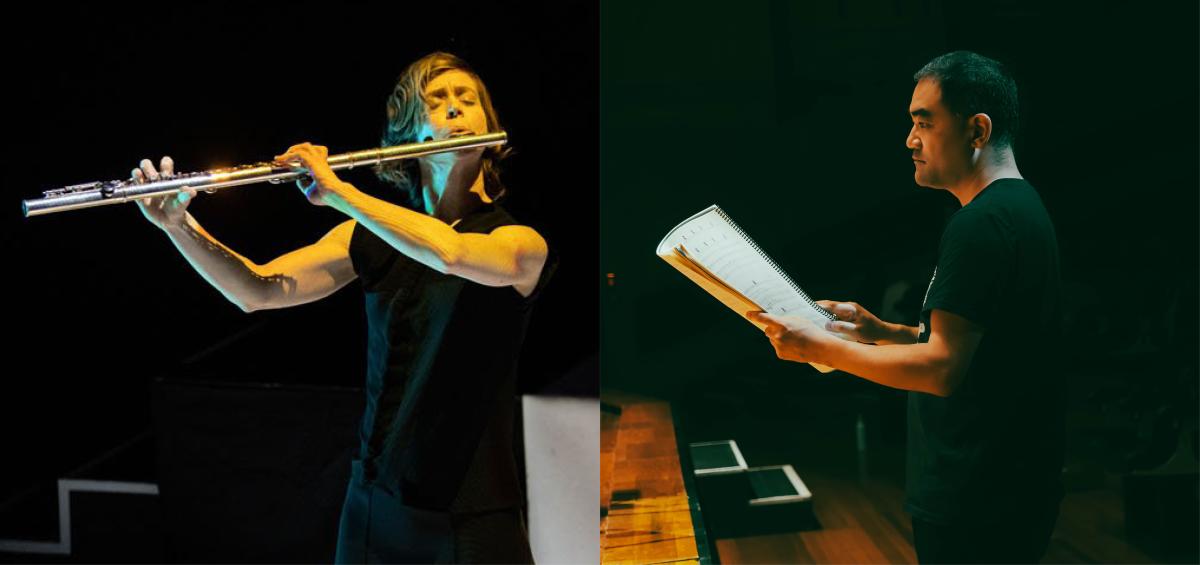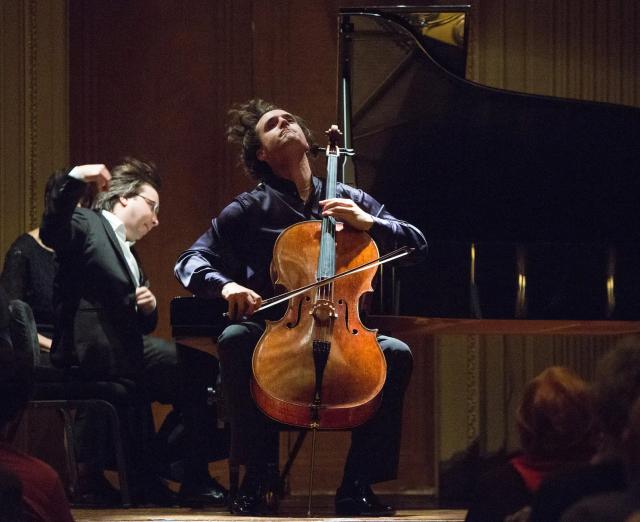Claire Chase, Joshua Rubin, and David Bowlin play music by Dai Fujikura
Chamber Ensemble

Claire Chase, described by The New York Times recently as “the North Star of her instrument’s ever-expanding universe,” is a musician, interdisciplinary artist, and educator. Passionately dedicated to the creation of new ecosystems for the music of our time, Chase has given the world premieres of hundreds of new works by a new generation of artists. She was the first flutist to be awarded a MacArthur Fellowship in 2012, and in 2017 was the first flutist to be awarded the Avery Fisher Prize for Classical Music from Lincoln Center for the Performing Arts. Chase was the Richard and Barbara Debs Creative Chair at Carnegie Hall in the 2022-23 season, only the second time in that organization’s history that the position has been given to a performing artist.
Chase has performed as a soloist recently with the New York Philharmonic, Los Angeles Philharmonic, Helsinki Philharmonic, BBC Scottish Symphony, Munich Chamber Orchestra, London Philharmonia, and San Francisco Symphony, where she is a Collaborative Partner with Esa-Pekka Salonen. In the 2022-23 season, Chase premiered a new double concerto by Felipe Lara with the vocalist and bassist esperanza spalding and the conductor Susanna Mälkki, which was named one of the Best Classical Music Performances of the Year by The New York Times. Chase’s discography includes eight solo albums of world premiere recordings and dozens of collaborative recordings with ensembles, composers, and sound artists from a wide range of musical genres.
In 2013, Chase launched the 24-year commissioning project Density 2036. Now in its eleventh year, Density reimagines the solo flute literature over a quarter-century through commissions, performances, recordings, education, and a community-focused approach to cultural production. Central to the Density initiative is a commitment to supporting an international, multigenerational community of flutists who will take the Density repertoire in new interpretive directions. The Density Fellows program, launched in 2023 in celebration of the tenth anniversary, will provide ten exceptional emerging flutists annually with the resources to intensively study the Density repertoire with Chase and the Density composers. In 2023, Chase performed all ten Density programs to date in a weeklong series of events co-produced by The Kitchen and Carnegie Hall. Chase will premiere the newest Density installation, an evening-length work by the legendary composer Terry Riley, in May 2024, in collaboration with the JACK Quartet.
As an undergraduate at Oberlin Conservatory, Chase co-founded the International Contemporary Ensemble, a collective of musicians, digital media artists, producers, and educators committed to creating collaborations built on equity and cultural responsiveness. She served as the ensemble’s artistic director until 2017 and as an ensemble member on performance and educational projects on five continents, developing an artist-driven organizational model that resulted in the premieres of over 1,000 new works and earned the group multiple Chamber Music America/ASCAP Awards for Adventurous Programming, the Trailblazer Award from the American Music Center, and the Ensemble of the Year Award from Musical America Worldwide.
A deeply committed educator, Chase is Professor of the Practice in the Department of Music at Harvard University, where she teaches courses on contemporary music, interdisciplinary collaboration, and cultural advocacy. Chase is also Creative Associate at The Juilliard School. Her Debs Creative Chair residency at Carnegie Hall encompassed programming for all ages, including a “Day of Listening” for children and families inspired by the listening philosophies of Pauline Oliveros. Chase will partner with the Getty Museum and PST ART x Science in Los Angeles to expand her Paulive Oliveros project as part of the “Art & Science Collide” festival in 2024-25.
Chase grew up in Leucadia, California, with the childhood dream of becoming a professional baseball player before she discovered the flute. She now lives in Brooklyn.
Dai Fujikura was born in 1977 in Osaka, Japan and moved to London when he was 15 to study at Dover College as a music scholar to complete his secondary education. His initial ambition was to compose music for cinema. Studying the music of Pierre Boulez, György Ligeti and Tōru Takemitsu at Trinity College of Music caused a gestalt shift: Dai became an aspiring contemporary composer whose extensive knowledge of cinematography gave his music a fresh, individual voice. Imagining sounds as images produced music with considerable dramatic structure and strength. By the end of his second year, he had already won the Serocki International Composers Competition. Before graduating, Dai's music has been broadcast on many European radio stations, won several other prizes, and has been performed by a list of illustrious ensembles and soloists including the London Sinfonietta.
Despite this fortuitous start, and the strength of early works such as Frozen Heat, Cari4nics and Eternal Escape, Dai wanted to develop his technique. A visit to Darmstadt, where he first heard Japanese traditional music, and a Masters with Edwin Roxburgh at the Royal College of Music helped Dai embrace this musical heritage, composing works like Okeanos Breeze for a mix of Japanese and Western instruments. Whilst at the Royal College of Music, he was also mentored by Péter Eötvös, writing Fifth Station for the London Sinfonietta.
This period denotes an important phase in the development of Dai's music. He experiments with spatial separation, a technique where he breaks up the traditional seating of the orchestra, sometimes placing them around the auditorium for both aural and dramatic effect. The first orchestral work using this technique was Calling Timbuktu (2nd prize Takemitsu Competition 2003) has been performed by the Tokyo Philharmonic and BBC Symphony Orchestras. Also, he starts to experiment with video, writing teki and moromoro for solo piano and film. Research into spatial separation, and cinematographic musical structures continued at King's College London under George Benjamin, leading to a PhD.
A portrait concert by the Philharmonia Orchestra (part of the RFH Music of Today series with Martyn Brabbins), retrospectives in New York and Chicago, work with Ensemble Modern, Klangforum Wien, and a subsequent major commission for Vast Ocean at Donaueshingen Music Days with Eötvös launched Dai as a major new voice of the European avant-garde.
Pierre Boulez, with whom he first worked whilst writing Stream State for orchestra (premiered at the Lucerne Festival, and receiving five other performances in 2006 alone) was a major supporter of his work: Dai was one of only two people asked to write a piece for the official Boulez 80th birthday celebrations at Cite de la Musique (Code 80). Subsequent commissions include two pieces for Ensemble Intercontemperain (one celebrating their 30th birthday), a new work for twelve percussionists for the 2006 Lucerne Festival, a major orchestral and electronic work commissioned by IRCAM and Orchestre Philharmonique de Radio France, and a piano concerto for Noriko Ogawa and the Philharmonia Orchestra.

